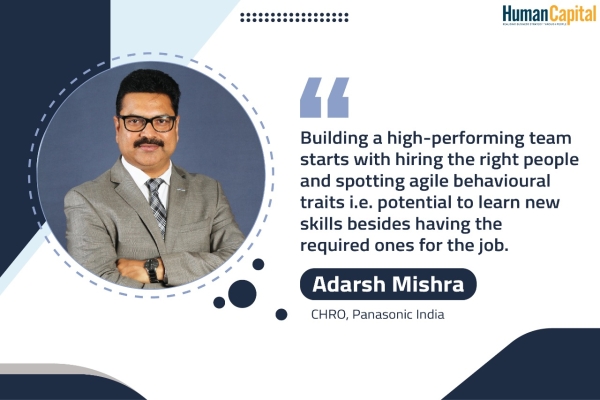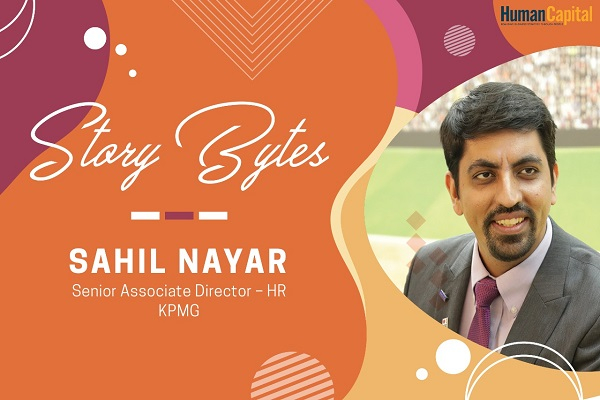While several areas can be a priority for a CHRO, the future of work will most likely be hyper-care and high-tech built on the foundation of a strong value system.
One year into the pandemic and one no longer finds the term ‘new normal’ to be new anymore. The world is now well-adapted to being physically distanced but virtually connected. As humans, it was indeed difficult for us to align to the concept of a virtual workplace. However, keeping the safety of the community at large and the proven efficacy of remote work, everyone has gotten habituated with it. Organisations also witnessed an innovative boost and a greater focus on learning agility, augmenting their business strategy and outcomes. However, one is not turning a blind eye to some of the evident challenges brought about by virtual workplaces.
To name a few:–
• Reduced human touch
• Personal connect leading to lower levels of camaraderie and collaboration
• Technological hindrances to delivering high-quality outputs
• Lack of accountability
The other pertinent aspect to bear in mind is the increasing VUCAness, with 2021 seeming to be more challenging as compared to the last year. However, the silver lining is that while there was no solution in sight last year, there is one now.
Hence, while looking to resolve the basic hygienic needs of people and organisation, fellow People Champions also need to elevate and leverage the opportunities arising out of this new normal. CHROs need to keep restructuring and reinventing their policies, programmes, practices, and philosophy to continuously respond to the unpredictable external world.
The top 5 priorities for 2021 for CHROs should be the ones mentioned below:–
1. Mental wellness as the top “Employee Wellbeing” agenda
A lot has already been written on the need for organisations to focus on mental well-being. And there have been ample studies that show the importance of the overall financial health of the organisation since we cannot expect a mentally stressed and anxious workforce to work to the best of their abilities. With the COVID-19 pandemic going out of bounds, and one’s social network transitioning from physical to virtual, it is a no brainer that the well-being of people should be the core agenda of businesses with a greater focus on mental health. Extended insurance cover for COVID-19 and related diseases so that people do not fret over medical expenses while they focus on work, Employee Assistance Programmes (EAP), meditation courses, Yoga, online consultation with counsellors, etc. are some of the ways by which organisations can drive the well-being agenda at the workplace.
2. Connect and Communicate to enhance employee experience
Retaining cultural ethos, delivering a high-quality employee experience and keeping the morale high has been a big challenge brought forth by remote work. A distributed workforce is difficult to connect with at a deeper level and driving a high-engagement and high-performance culture becomes all the more difficult. While communication has always been the biggest contributor to building a high trust environment, it became even more critical when the workplace turned virtual. CHROs need to ensure that leaders in the organisation frequently communicate with the teams through various formal and informal channels and foster free-flowing two-way communication. This not only helps enhance the connect, but also gives a chance for leaders to motivate and inspire people.
Likewise, interventions around people connect need to be high on emotional connect where people get an opportunity to express themselves, feel connected with colleagues and the organisation and find joy at the end of the day. Here, the recipe for success is co-creation. Allow people to curate their own engagement strategy, and you shall see greater enthusiasm and positivity.
3. Bridging the talent gap and empowering people
A 2020 skills survey by Gartner predicted that 33% of the skills that were present in an average job posting in 2017 would be rendered redundant in 2021. Adding to this, the COVID-19 pandemic made us realise the paucity of skills in our workforce when it came to facing a crisis. Hence, building critical skills and competencies in the workforce should be another focus area for HR leaders in the new normal. We need to encourage people to move beyond their comfort zones, take risks, and also fail, and in the process, they learn, unlearn, and learn. CHROs should also ensure that people are reskilled and upskilled from time to time so that we have a ‘future ready’ workforce which is ready to face any challenge. It is also important to develop skills like humility, resilience, and empathy in the leaders as it not only helps build stronger relationships but also helps gain loyalty and commitment of the people.
4. Increase your digital quotient
The new normal of remote working and hybrid working forced organisations to leverage the use of technology. However, a year later, the question to be asked would be ‘do organisations have a strategy for digital transformation?’ It is very important for HR leaders to ensure digitisation of various processes in an employee life cycle as it not only enhances the employee experience, but also helps off-load mundane tasks so that HR can focus on more meaningful work.
For instance, AI chatbots are the next big thing since they provide a human-like interface and help gather feedback on various aspects of an individual’s experience in the organisation. By using massive amounts of data and machine learning, AI can help enhance decision making for HR and business leaders. Technology can also go a long way in improving the quality of life of people as it helps us avoid the drudgery of banal and routine tasks.
5. Driving operational efficiency through a blended workforce
As organisations seek agility and adaptability to compete in a dynamic environment, the nature of the workforce is also slowly becoming more fluid as it allows organisations to have access to a broad spectrum of talent than what is already available at their doorstep. From independent workers to freelancers and gig workers, from full-time schedules to part-time and hybrid work schedules - the workforce around is changing rapidly. Hence, CHROs need to work towards implementing a blended workforce strategy at workplaces to drive operational efficiencies and cost-effectiveness.
Last year, the pandemic came about with a lot of challenges and affected many facets of our life, but one strongly believes that a positive future entails us if we are able to change ourselves and capitalise on the underlying changes. Fellow peers must ensure that organisations are upbeat with the changing trends and evolve with time. While there can be many more aspects and areas which can be a priority for a CHRO, one feels that primarily the future of work will most likely be hyper-care and high-tech built on the foundation of a strong value system.
.png)
Do you think hybrid work arrangements would be a common feature of the workplaces going forward?
Trending
-
SBI General Insurance Launches Digital Health Campaign
-
CredR Rolls Out 'Life Happens' Leave For Its Employees
-
Meesho Announces 30-Week Gender-Neutral Parental Leave Policy
-
Microsoft Unveils Tech Resilience Curriculum To Foster An Inclusive Future
-
60% Indian Professionals Looking For Job Change Due To COVID: Survey
-
SpringPeople And Siemens Collaborate For Digital Transformation Push
-
86% Professionals Believe Hybrid Work Is Essential For Work Life Balance: Report
-
Almost 1 In Every 3 People's Personal Life Affected Due To Work Stress
-
Meesho Rolls Out Reset And Recharge Policy For Employees
-
80% Of Talent Leaders & Academics Say Pandemic Changed Skill Needs For Youth: Report
-
Hero Electric Rolls Out 'Hero Care' Program For Employees
-
Human Capital In Collaboration With ASSOCHAM Hosts Virtual Conference
-
IKEA India, Tata STRIVE Collaborate To Create Employability And Entrepreneurship Opportunities
-
SAP India, Microsoft Launch Tech Skilling Program for Young Women
-
DXC Technology, NASSCOM Collaborate For Employability Skills Program
-
Lenskart To Hire Over 2000 Employees Across India By 2022
-
Mindtree Launches Learn-and-Earn Program
-
Tata AIA Extends 'Raksha Ka Teeka' To Its Employees
-
Swadesh Behera Is The New CPO Of Titan
-
NetConnect Global Plans To Recruit 5000 Tech Professionals In India
-
Hubhopper Plans To Hire 60% Of Indian Podcasters By 2022
-
Corporate India Needs More Women In Leadership Roles: Report
-
Aon to Invest $30 Million and Create 10,000 Apprenticeships by 2030
-
Tech Mahindra Launches ‘Gift a Career’ Initiative for Upskilling of Youth
-
40% Women Prefer Flexible Working Options in Post-COVID World: Survey
-
3 out of 4 companies believe they can effectively hire employees virtually: Report
-
Vodafone , CGI and NASSCOM Foundation launch digital skills platform
-
Odisha: Bank, postal employees to deliver cash for elderly, differently-abled persons
-
Skill India launches AI-based digital platform for "Skilled Workforce"
-
Hiring activity declines 6.73% in first quarter: Survey
-
70% startups impacted by COVID-19 pandemic
-
Bajaj Allianz Life ropes in Santanu Banerjee as CHRO
-
Over 70 Percent MSMEs look at cutting jobs to sustain businesses
-
93 Per Cent employees stressed about returning to office post-lockdown
-
Johnson & Johnson India announces family benefits for same gender partners
-
Indian firms turning friendly towards working mothers
-
Welspun India names Rajendra Mehta as new CHRO
-
Wipro partners with NASSCOM to launch Future Skills platform



Human Capital is niche media organisation for HR and Corporate. Our aim is to create an outstanding user experience for all our clients, readers, employers and employees through inspiring, industry-leading content pieces in the form of case studies, analysis, expert reports, authored articles and blogs. We cover topics such as talent acquisition, learning and development, diversity and inclusion, leadership, compensation, recruitment and many more.
Subscribe Now












































Comment